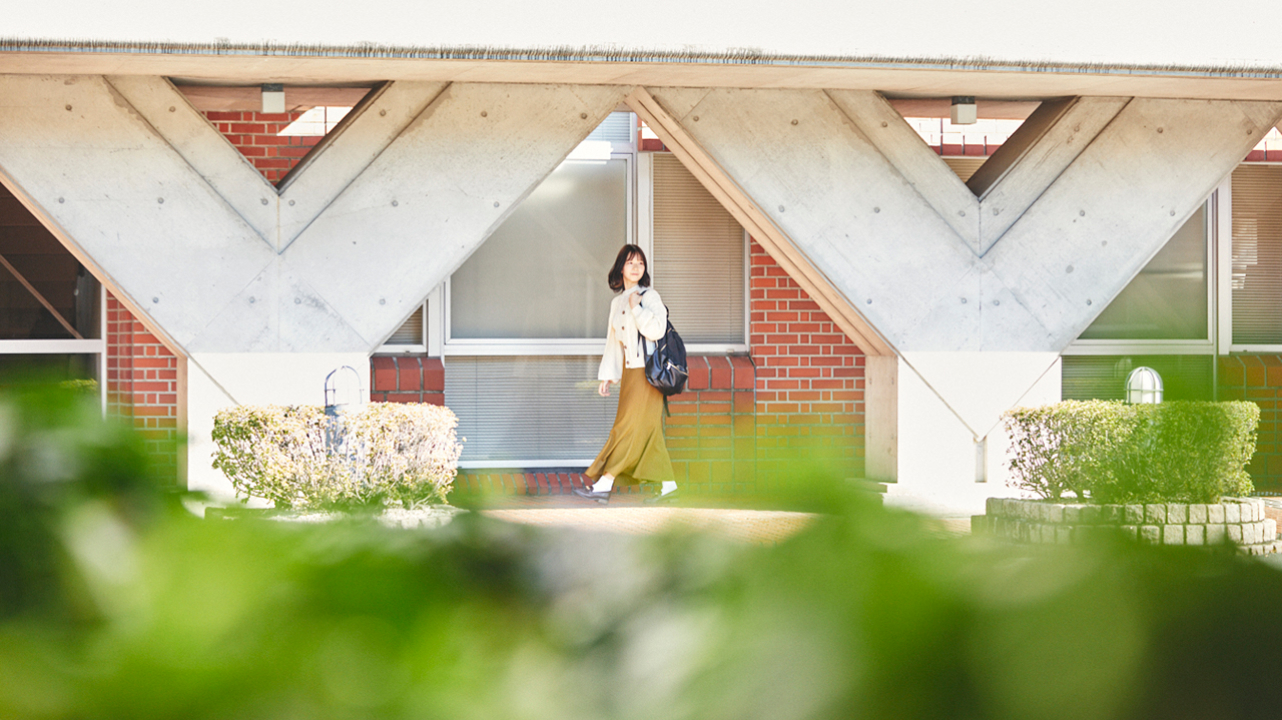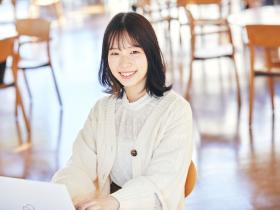“For others” is my driving force
Yui Ishii became interested in local government and politics through a political economy course in high school, and she enrolled in our Department of Political Science with a desire to learn more about those subjects. Since starting school here, she has continued to research topics such as the kinds of motivation needed to increase voter turnout in elections. She tells us about her driving force as she considers how she can work for others.


Yui Ishii
Fourth-year student, Department of Political Science, Faculty of Law
After joining the Department of Political Science, Ms. Ishii participated in the Kanagawa Electoral College, focusing on activities to promote participation in elections by high-school students. Her hobbies include playing the trombone, and she has loved music since elementary school. She recently started working out at a gym. She has started freezing the chicken breasts she eats as part of her training regimen.
Roles that connect people
I tend to be the type of person who is good at listening to others, rather than directing the flow of conversation. I find it very stimulating to listen to the stories of various people, something I find so enjoyable that I can listen to them for hours. At some point, I became good at standing between my friends and finding points of commonality that connect them. It made me very happy to bring together friends with completely different personalities and help them become friends too, so I considered that to be a position that suits me well.
I became particularly aware of that aspect of myself when I started looking for a post-college job. Realizing that I was good at being in such a position, I was able to decide on the career path I wanted after graduation. I believe it is because of my experiences that I have become good at bringing people together.

Playing in my school band helped me grow
I’ve played trombone in school bands since elementary school. I first joined the band just because I loved music, but I nearly gave it up in high school due to the demands of practice and my classmates’ high level of skill. However, I still remember and cherish something my director told me: “Do something that prepares your mind.”
When I became too busy with practice and lost sight of what I should be doing, the important thing was to pause and think calmly instead of rushing ahead. That’s what my director’s words taught me, and after hearing them, I went back to basics, such as practicing twice as much as I had before, properly greeting others, and listening carefully to what others say so I could understand their intentions. This allowed me to gradually gain recognition from my seniors, and I started to receive a lot of advice from them. I believe that continuing to thoroughly practice these basics allowed me to bridge the gap between myself and my classmates.
When I got to demonstrate the results of my efforts at concerts, I felt a sense of accomplishment for having really worked hard. I was also filled with gratitude for those who had helped me through the difficulties I’d experienced. I feel that the experience I gained through band has enabled me to think about what I should do now and act accordingly.

Encountering political economy
I entered Meiji Gakuin University because I was interested in its Department of Political Science. I was interested in that department because I’d become interested in Japan’s political issues in a political economy course I took in high school. Our class assignment was to make a policy proposal for Tokyo’s Ota Ward. The ward has policies in support of expectant and nursing mothers, such as training for how evacuation shelters should accommodate them. To address the issue of where shelters for expectant mothers should be located, we made two proposals: one for using schools as shelters and one for creating an application that would allow people to locate shelters quickly. This class brought me into contact with contemporary issues I had never encountered before. It made me want to learn more about the issues facing Japan, think about how we can resolve them, and do something to help those in need, even if only a little.
It was in this context that I came across the Department of Political Science at Meiji Gakuin. I still remember the cool, dazzling students I met at the University’s open campus. What really decided it for me, however, was Meiji Gakuin’s educational philosophy of “Do for Others,” which is directly linked to my desire to do something to help those in need. I felt a similarity between that way of thinking and my own, and I very much wanted to study in a department of political science at a university that adheres to such an educational philosophy.
The Kanagawa Electoral College
In my first-year fundamentals of political science seminar, I learned about elections and the low voter turnout rates in Japan. I had taken voting for granted, so learning that this was not the norm made me want to know more about why not everyone chooses to vote. At around that time, I took a course called “Fieldwork,” where we studied elections in depth. Fieldwork is a unique Department of Political Science course in which students work one-on-one with their instructor to deepen their research in an area of their own choosing. Through this course, I acquired a sense of crisis, a feeling that if the current voting rate of young people continues while the population continues to age, Japan will become a place where the opinions of the generation that will support the country in the future will remain unheard.
Thinking about what I could do to get people to come to the polls, I started wondering why I myself unhesitatingly participate in elections. The conclusion I came to is that I consider elections as being something directly related to me, in my case, specifically because those political economy courses I took in high school stuck with me. I thus hope that more high school students, who will soon have the right to vote, will have their own opportunities to see voting as something directly related to them.
In my seminar, I saw a notice about the Kanagawa Electoral College, an organization that, as a measure to improve low voter turnout rates among young people, hosts participatory educational activities in which students become involved in election administration and related activities. That was the kind of activity I wanted to do, so I immediately applied for the position.
Through the Kanagawa Electoral College, I visited a high school and spent one political economy class period conducting a mock election. Specifically, I became a fictitious candidate for office and talked about my policies and the like. This activity allowed high school students to experience voting by asking them to decide which candidate they prefer. When doing so, I tried using pictures and other materials to explain how elections work in an easy-to-understand way, thereby dispelling any impressions that they are overly formal, complex affairs.
Apost-class survey included comments like “Experiencing voting showed me that it isn’t all that hard, that it’s something I can do.” I felt really happy to have lowered the barriers to voting, even if only a little. It was a very rewarding, positive experience for me to think that because of this class, some students would go out and vote.

Wanting to do for others what others had done for me
My experience at the Kanagawa Electoral College, where I worked toward creating a world that reflects the opinions of young people who will be active in society, made me realize that I am a person who finds it rewarding to work for the benefit of others. It made me realize just how closely “Do for Others,” an attitude I’d only vaguely sympathized with before coming to Meiji Gakuin, aligned with my own axis. I believe it was the support of various people that made working for others feel so rewarding. The Electoral College staff, as well as my coaches, teachers, parents, and friends, continually supported me after I realized what I wanted to do. I was blessed with people helping me, so I wanted to return the favor, and I have developed an even stronger desire to act for the benefit of various people. I hope to continue living a life in which “for others” remains my key guideline.
Maintaining my axis in the future, too
After graduation, I plan to work at a company in the finance industry. I considered working for a local government like that I became involved with through the Kanagawa Electoral College, but I also have a strong desire to work to solve more personal issues, so I decided to work for a financial services company, where I could consider people’s current situation and make proposals tailored to their needs. After I start working for the company, I hope to remain conscious of “for others” as my personal axis, making proposals that are suited to whom I am working with and always keeping in mind what my clients need. I am sure that as I enter the workforce, I will encounter problems and I will sometimes become overwhelmed. At such times, I hope I remember what I have experienced so far and that I can use that to overcome such problems. In particular, I want to overcome the obstacles that lie ahead of me by remembering to “prepare my mind,” as my teacher taught me, and to remember that a desire to help others is my driving force, as I realized at Meiji Gakuin University.

